The Rev. Tim Schenck serves as rector of the Episcopal Parish of St. John the Evangelist in Hingham, Massachusetts. His latest book is “Holy Grounds: The Surprising Connection Between Coffee and Faith.” Follow him on Twitter @FatherTim. The views expressed in this commentary do not necessarily reflect those of BCNN1.
“The ancient Greeks had four words for love,” the narrator intoned.
I froze, with a guacamole-laden tortilla chip perched inches from my watering mouth, wondering if one of my kids had inadvertently changed the channel away from the Super Bowl. What could ancient Greek, and words I learned my first semester of seminary, possibly be doing amid the most expensive ad buy of the year?
As the 60-second spot for New York Life unfolded before my eyes, I was amazed to hear an explanation of these four aspects of love.
The insurance company’s ad continued: “The first is philia — philia is affection that grows from friendship. Next, there’s storge – the kind you have for a grandparent or a brother. The third is eros, the uncontrollable urge to say ‘I love you.’ The fourth kind of love is different. It’s the most admirable. It’s called agape – love as an action. It takes courage. Sacrifice. Strength.”
If those sound familiar, chances are it’s because of C.S. Lewis, the 20th-century Anglican academic, Christian and author of the beloved “Chronicles of Narnia,” who wrote about them in a book titled “The Four Loves.” In it, he highlighted the same four types of love delineated by New York Life: storge (affection), philia (friendship), eros (romantic) and agape (charity).
Now, at one level, I should be grateful that an insurance company with deep enough pockets to afford a Super Bowl ad has added a nuanced definition of love to the public conversation. In between brain-rattling tackles and blatant consumerism was planted a seed of beauty and joy, inspiration and hope.
Yet it was New York Life’s definition of agape that caused my initial excitement to morph into “Stay in your lane, you behemoth, soulless insurance company!”
Because for Lewis and for Christians more broadly, agape, that greatest of all loves, is the unconditional, all-encompassing, selfless, divine love embodied in Jesus Christ. Christ’s love is freely given with no expectation of return. And while Jesus makes a claim upon his followers, it has nothing to do with filing an insurance claim, and everything to do with baptismal identity.
If love is “an action” as the ad claims, “strength” is not a part of the equation — at least not for a faith where “power is made perfect in weakness” (2 Corinthians 12:9). As Lewis writes in “Mere Christianity”: “If you want to get warm then you have to stand near the fire; if you want to get wet, then you have to get into the water.”
Source: Religion News Service
All Content & Images are provided by the acknowledged source
